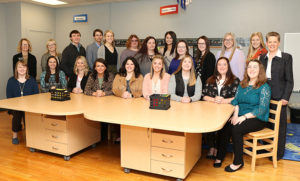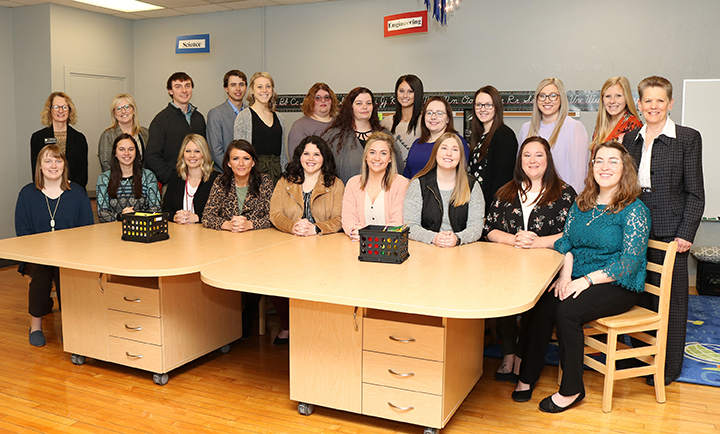by Michelle Willson, Feature/Entertainment Editor
There have been some big changes to the student teachers’ schedules this year.
It used to be that the student teachers were in Northwestern classrooms for the first couple of weeks of the semester before entering their host classrooms. But due to a new certification exam, the PPAT, the student teachers needed to be in their host classrooms earlier than they did in past semesters. This year’s batch of student teachers started in their host schools the first Friday of Northwestern’s spring semester.
Being slowly introduced to the students helps build trust, said Kaitlin Lawunyon, a senior health and sports science education major. Instead of being “thrown in” as in previous years, they had to start teaching right away.
Lawunyon explained that the students get to see that their teachers are taking this seriously, and it enables teachers to be more effective in the classrooms.
“We get more time with the students, to get to know them and to build that relationship with them,” Miranda Lawson, a senior special education major, said.
Northwestern students are taking three classes: assessment and evaluation, multicultural education in classroom management, and behavioral interventions II. The assessment and evaluation course gives a more in-depth look than their previous classes did.
The classes “bleed” into each other very well, Lawson said. It is hard to differentiate between classes other than that there is a different teacher teaching it. It makes it feel more fluid, she said.
Classroom management and behavioral interventions II looks at theoretical problems that the student teachers might witness in the classroom. It also teaches students how to defuse and avoid the situation.
In classroom management, Dr. Christie Rylie teaches about viewing the student in different ways, Lawunyon said. She further explained that being in a gym is different from being in a classroom. The class gives a different insight and reminds the student teachers that they are going to have to continually grow and adapt to how a classroom is going to run.
In multicultural education, the student teachers watch videos and do projects. One of the projects they completed last week were drawings of what a good and bad administers and students looked like. The drawings included big hands for helping and big ears for good listening.
The multicultural education class has new content, unlike anything they have had before, according to Alexis Stuart, a senior early childhood education major.
This is the first time the different divisions of education have sat in a classroom together. It is the first time that students are able to experience what the other student teacher’s class goes through. The student teachers who teach high school students will have different problems than those teaching early childhood.
Stuart said that she is an early childhood education major because kids need the teacher that she did not have growing up.
The student teachers experience a lot of guest speakers and group work during their time in Northwestern’s classrooms. They talk about their experiences in their host classrooms and how they solved problems. They discuss how the situations will benefit them when they become teachers. They can also learn from each other‘s experiences and discuss what the best approach would be if it happens again.
“Steve Tanio from OSBI was my favorite speaker,” Caitlyn Shortnacy said.
Tanio spoke about drug abuse signs to watch for, and what to do if you suspect a student is using or selling drugs, Shortnacy said.
Representatives from Oklahoma Ag in the Classroom, a non-profit program by the Oklahoma Department of Agriculture, came and talked to the student teachers.
When Ag in the Classroom came, they gave the students free supplies, resources, and agriculture-related activities to utilize in their future classrooms, Stuart said.
“My favorite project from this semester was the cultural learning activity,” Shortnacy said. “It is interesting to see how much it still affects kids.”
Student teachers will start full weeks in their host classrooms Feb. 10.


